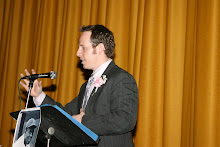The school year is coming to a close as this is the last Principal’s Message of the school year. I would like to take a moment to reflect on how successful the month of May has been. To begin with, Ms. Terri and her angels hosted another successful Career Day. The highlight was being able to watch them on Channel 11 with Lisa Mateo. We completed our first month of loaded testing with minor glitches but nothing that affected our students from performing to the best of their ability. Thanks to the help from Ms. McKinley and all of our staff we had the lowest number of make-ups ever in school history. We hosted our first annual Jazz Event sponsored by “All About the Swing.” Our PTA sponsored a carnival that raised over $300 for our school. It was the largest PTA fundraiser we had in over 3 years. Our boys’ soccer team went undefeated through the entire month and will compete for the championship on June 5th. We had several successful class trips. We hosted another perfect attendance celebration and finally awarded the students for Principal’s List and Honor Roll for the last two marking periods. We have made tremendous progress in preparing our CEP for the 2010. For instance, the math department completed their action plan and the goals for 2010-2011 are almost ready for the entire staff to give feedback. We hosted several author visits throughout the month with the support of Behind the Books.
The exciting part is we have less than 20 school days left and we have a month packed full of activities like Prom, a trip to Lincoln Center, two field days, 8th grade graduation, and our 7th and 8th grade trips. In addition, we will be making our promotional decisions, closing the school year, and finalizing our plans for the 2010-2011 school year.
ACTION PLANS
We will be dedicating our department meetings to creating our action plans which will be directly correlated to the school goals. The first part of the plan will require us to analyze our most current collected data. From there, we will assess our needs. For instance, in the math department, we discovered that our Hispanic students scored almost 17 percentage points above our African American students. We also realized that our students were able to carry out procedures but were struggling with applying the concepts to varied scenarios. Our students could carry out the order of operations within our classrooms. When it came to a test, they failed to do so. Several other examples verified our belief and it was all supported by data. The students were learning the material but were not gaining a deeper understanding of the concepts. Without the deeper understanding, the students would struggle with applying what they were taught to varying scenarios. We also realized that in many of our extended response questions, our students understood the concept but did not know what the question was asking. Key words such as simplify were not being carried out because the students did not comprehend what the question was asking.
Our focus for the math department will be to increase our analyzing and organizing skills and create more opportunities to gain understanding and move away from memorizing. We developed a list of about 10 strategies that will help drive these foci forward. One of our prime strategies will be to teach our students how to distinguish between relevant and irrelevant information so they can properly plan a solution to a problem. To make sure we do not drift from our plan, we crafted an action plan with a calendar on how we can ensure we would echo the strategies throughout the school year. For instance, within the first month, we will be implanting vocabulary lists at the beginning of our mini-lesson to scaffold the content and reiterate the words used during the state assessments so that our student do not continue to struggle to comprehend what questions are actually asking. We will also be using a graphic organizer to problem solve, answer extended response questions, and take on our daily word problems.
The math department’s action plan will help us to work as a group on the deficiencies of our students. By reiterating common methods of problem solving, increasing vocabulary, and developing a deeper understanding of the concepts, we are building a stronger student for the next grade level to inherit. We are also preparing our students to perform better on the state assessment, which the math department chose to set as the goal of our action plan. We plan to raise our scores by 10%. We are also planning to close the achievement gap between Hispanic and African American students by 5 percentage points (right now, there is a 17 point differential). By developing our action plan, which was supported by data and crafted by our analysis, we have a clearer understanding of what next year is going to look like.
OUR BIG INITIATIVES
Through the process of creating our action plan, two needs came to the surface. If we plan to provide more opportunities for our students to gain a deeper understanding of the material, then how will we do this with the same number of days in the school year along with the same number of standards. Hence, our first big initiative was developed in alignment to the expectations of the Quality Review. One of our major initiatives will be to reduce the number of standards we are covering in a school year. By doing this, we can provide more days during the school year to explore concepts. The biggest challenge we face during the school year is trying to cover all of the standards before the test arrives. We know we are reaching a low level of proficiency with a majority of our students by touching upon the concepts rather than digging deep into the reasoning behind them.
By significantly reducing the standards according to the expectations of the state assessment, the needs of the teachers of the following grade, and the proficiency level our students must reach to be successful in high school, we believe we can come up with a list of needed standards so that more time during the school year can be dedicated to reaching proficiency for a majority, if not all, of our students. This will allow for us to apply many of the strategies in our action plan such as encouraging students to discover patterns to realize there is more than one way to solve a problem, providing hands-on projects so the students can explore concepts, and providing more opportunities for real world application to get a clearer understanding of concepts.
Our second big initiative is to convert our meetings into unit planning sessions. We know we will have to invest our first month to assessing our students and identifying their goals. By October, we hope to begin planning for our November units. Although October may be a challenging month since we will be planning for our day-to-day classes and planning ahead, November will become much easier as we will only be planning for December and not the day-to-day classes. If we are successful, we will convert our preparatory periods into periods where we can set up our classrooms for hands-on projects, call homes for both positive and behavioral reasons, and write or take care of any other type of paperwork such as anecdotals or grading assessments.
A key component to making this work will be to have teachers share their units so two people are not planning the same lesson. A second key component will be to develop the department to a level where they feel comfortable giving each other feedback about a lesson. One way we will do this is by collaborating on a rubric to set our expectations of what type of a lesson will help us reach our goal and apply our strategies. We will need to put together a format for lessons that we all agree upon and, again, will help us reach our goal and apply our strategies. The process sounds much easier than it is. This is where administration will have to do their homework to make sure we are giving the necessary support to move forward with this type of work. I think in the end, the level of stress teachers may feel this year will be reduced significantly because you will be able to concentrate more on setting up a lesson rather than planning a lesson, setting it up, turning in anecdotals, calling home to a parent, and turning in your assessments.
WHAT IS DRIVING WHAT?
The CEP will be the core of our upcoming school year. The goals we develop within our CEP will drive our action plans. Our action plans will move our teacher goals forward. Finally, our teacher goals will allow us to help our students reach their goals. The responsibility I will have as the leader of our school will be to reiterate those goals on a regular basis and make sure the plans you develop are being carried out by supporting you and helping you to reflect on the work you are doing with our students. By strengthening the connection between the goals of our school and what is directly taking place in the classroom, we will have no choice but to see the plan through. It may need to be adjusted further down the road, which is a possible outcome of a process that measures and reflects, but it will be for the betterment of our students and not because we are afraid it may not work. In the end, if the plan is not working, which I doubt with all of our knowledgeable and hardworking staff, then we will know specifically why it is not and we will adjust because that is what successful schools do. And we are a successful school.
STAFF BIRTHDAYS:
Sandie Murphy June 17th
Terri Miles August 9th
Kristen Chaffee August 15th
Daniel Schultz August 22nd
Sandy Chmielewski August 30th
QUOTE OF THE MONTH:
“Education's purpose is to replace an empty mind with an open one.” --Malcolm Forbes
Subscribe to:
Post Comments (Atom)





No comments:
Post a Comment